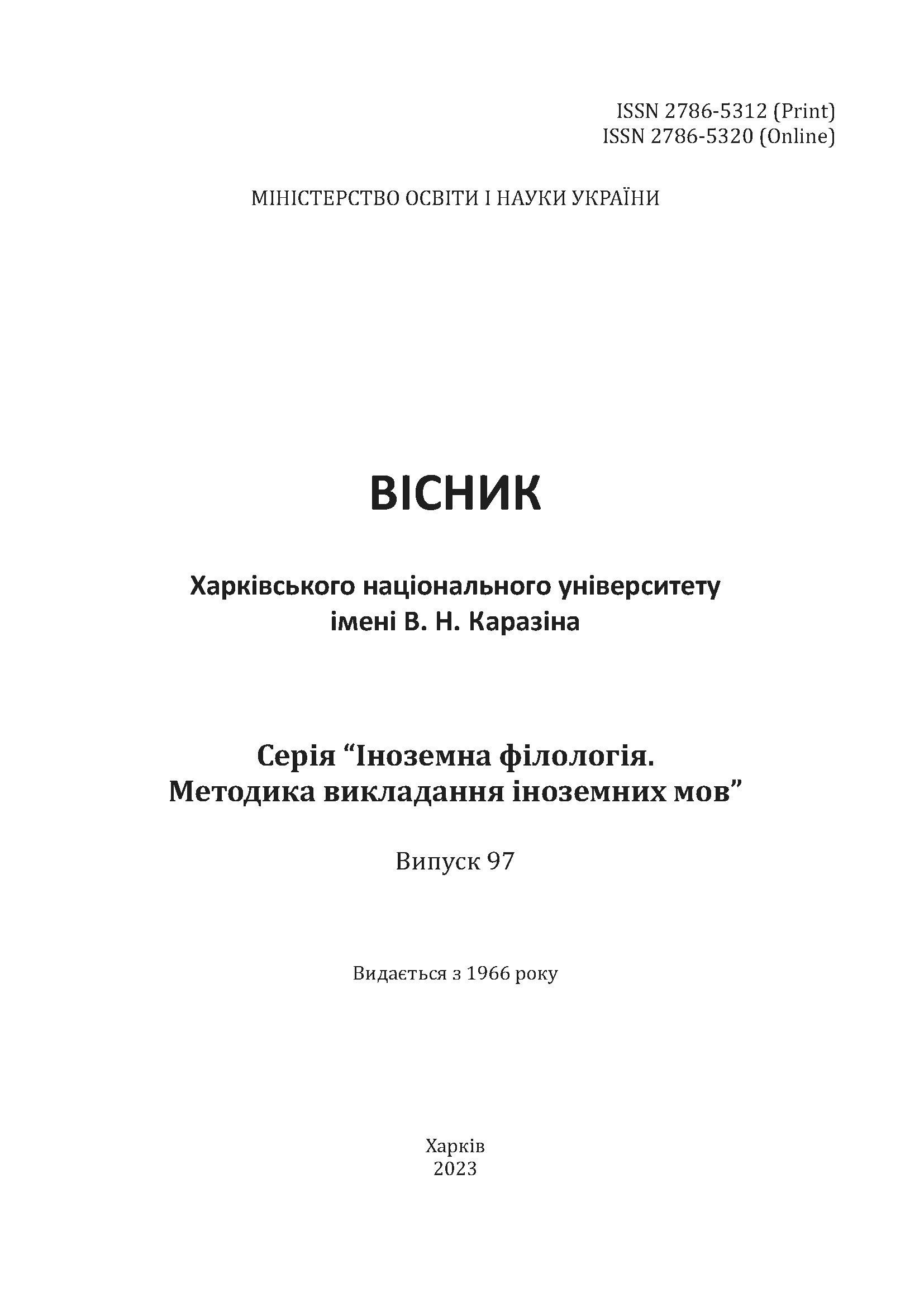Parallax in translation of ekphrastic poetry (case study of Wystan Auden’s ‘Musee des Beaux Arts’)
Abstract
The article focuses on the cognitive underpinnings and typology of translation transformations that they deploy in translating ekphrastic poetry. Ekphrasis is viewed as a rhetoric means of verbal rendering a non-verbal object, e.g. a picture or a painting. The article is a case study of Wistan Hugh Auden’s Musee des Beaux Arts and its Ukrainian translation. It renders several paintings of Old Holland Masters that feature the world’s indifference to people’s sufferings and other strong emotions. Theoretically, besides the area of cognitive linguistics, the study departs from the narrative theory that makes a special emphasis of the subjective nature of the narrative. Narrative subjectivity in translation accounts for the immediate semantic relations between the subject-author (the author of the original) and the subject-translator (the author of the translation). These relations are verbalized in translation and visualized in the so-called Du Bois’ narrative triangle. The triangle divulges these relations as a semiotic alignment that takes place in terms of cognitive transformations. Their specific nature is rooted in the process of verbalizing a visual object that is always accompanied by the changes of the aspects of the rendered painting. This process, consequently, conditions semiotic transformations of the verbalized object, or a parallax. Parallax in this study is identified as a system of cognitively underpinned transformations of the object that is rendered in an ekphrastic piece. Verbalizing two types of parallaxes are considered in the article. I designate an intermedial parallax that accounts for the transformations in verbalizing a visual object by the author of the original. Conversely, I consider a translation parallax as a system of cognitive operations with attention/salience deployed by the translator. Translation parallax is viewed in terms of the following operations: selection, scope of attention, scalar adjustment, and dynamic attention.
Downloads
References
Bondarenko, I.V. (2016) Kohnityvni operatsii z uvahoiu u perekladakh poetychnykh tvoriv J. Brods’koho. [Cognitive operations with attention in translations of Joseph Brodskiy]. Naukovyj Visnyk Mizhnarodnoho humanitarnoho universytetu. Seriia «Filolohiia». [Scientific Issues of International Humanitarian University, Series “Philology”]. № 25. Vol. 2, 152-156. (in Ukrainian)
Cherednichenko, O.I. (2007). Pro movu i pereklad. [On language and translation]. Кyiv: Lybid’. (in Ukrainian)
Croft, W., Cruse D. A. (2004). Cognitive Linguistics. Cambridge: Cambridge University Press.
Du Bois, J. (2007). The Stance Triangle. In R. Englebretson (ed.) Stancetaking in Discourse. Subjectivity, evaluation, interaction (pp. 139-182). Amsterdam/Philadelphia: John Benjamins Publishing Company.
Englebretson, R. (2007). Stancetaking in Discourse. An Introduction. In Stancetaking in Discourse. Subjectivity, evaluation, interaction (pp. 1-26). Amsterdam/Philadelphia: John Benjamins Publishing Company.
Foucault, M. (1966). Les Mots et les Choses, Paris, Gallimard. Retrieved from: https://monoskop.org/images/4/40/Foucault_Michel_Les_mots_et_les_choses.pdf
Heffernan James A. W. (2015). 1. Ekphrasis: Theory. In Handbook of Intermediality: Literature - Image - Sound - Music, edited by Gabriele Rippl (pp. 35-49), Berlin, München, Boston: De Gruyter. URL: https://doi.org/10.1515/9783110311075-003
Morozova, O.I. (2009) Paralaksni ob’iekty v linhvistytsi [Parallax objects in linguistics]. Visnyk Kyivs’koho natsional’noho linhvistychnoho un-tu. Seriia filolohiia. [Issues of Kyiv National Linguistic University. Series “Philology]. №3, Vol. 12, 5-9. (in Ukrainian)
Rebrii, O., Demetska, V. (2020). Adaptation, Association, and Analogy: Triplea of the Translator’s Decision-Making. East European Journal of Psycholinguistics. Lutsk: Lesya Ukrainka Volyn National University. Vol. 7, Number 2. 231–242.
Welsh, R. (2004). Ekphrasis. Theories of Media. Keywords Glossary. The University of Chicago. Retrieved from: https://csmt.uchicago.edu/glossary2004/ekphrasis.htm#:~:text=The%20idea%20of%20ekphrasis%2C%20both,the%20verbal%20and%20the%20visual.
Auden W.H. V muzei obrazotvorchoho mystetstva [Musee des Beaux Arts]. [translated by М. Strikha]. In W. Auden. Virshi ukrains’koiu [W.Auden Poems in Ukrainian]. Retrieved from: https://dovidka.biz.ua/visten-oden-virshi/
Auden W.H. Musee des Beaux Arts. Retrieved from: http://english.emory.edu/classes/paintings&poems/auden.html




